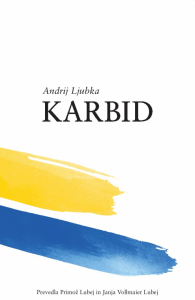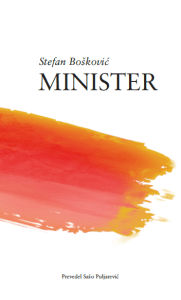Carbide
Vilenica CEI collection, Slovene Writers’ Association, 2019.
Author: Andrij Ljubka
Translators: Primož Lubej and Janja Vollmaier Lubej
This book was published with the support of the Slovenian Book Agency.
Carbide, or a novel about Stereotypes, Borders and Smuggling
Carbide is a satirical novel that is imbued with humour and irony. It reflects Ukrainian reality and the recurring flow of history that has seen new, modified, and depraved acts of individuals and the collective. Once again, the individual is not responsible for his actions; rather he is lost in the crowd. Carbide thematises various points of departure, such as the visa-dependent travelling of Ukrainians (only few of whom have the money to overcome this obstacle), the ignorance of Europe when it comes to Ukraine, the social elite and the poorer classes of the population, problems related to health care, the mass longing to flee to Europe, the longing for a better tomorrow, the sacrificing of one’s own health in hope of a brighter future. With this novel Ljubka wishes to eradicate stereotypes about Eastern Europe being a barbaric, uncivilized, violent part of the world. His conviction is that such a negative perception was established by Voltaire’s Enlightenment-era Candide, while today he blames Brussels bureaucrats for rejecting Ukraine in the EU.
Andrij Ljubka (1987) ranks among the top young Ukrainian poets and writers and he is one of the most internationally recognized Ukrainian authors. He writes poetry (Eight Months of Schizophrenia, 2007; Terrorism, 2008; Forty Bucks Plus Tip, 2012), prose fiction (the 2012 collection Killer, the 2015 novel Carbide, and the 2018 novel Your glance, Cio-Cio-San), and he has written three essay collections (Sleeping with women, 2014, A Room for Sorrow, 2016; Saudade, 2017). He has received a number of literary prizes and fellowships for his works, including the illustrious CEI Award for Writers in Residence in 2017, in the framework of which the Slovene translation of Carbide was published. This novel is the author’s most resounding work. Andrij Ljubka translates from several languages, he is the artistic director of two international literary festivals in Ukraine, and he is also a publicist. He lives in Uzhhorod, the main city in Zakarpattia Oblast, and he is striving to see Ukraine become closer to Europe.
Minister
Vilenica CEI collection, Slovene Writers’ Association, 2022
Author: Stefan Bošković
Translation: Sašo Puljarević
A young artist dies during a performance in which the Montenegrin Minister of Culture also participates. Is the minister guilty? Does the ministry help artists or kill them? What is the role of art, cultural heritage, and culture in general in the ruins of wild transitional privatization, in a society that simply cannot shake off the question of identity? These are just some of the questions that arise in the ten days in which we follow Minister Valentin Kovačević, a bankrupt playwright with literary ambitions who navigates personal hardships ˗ a failed marriage, an authoritarian father, and a demented mother – as well as the duties imposed on him by his ministerial function. Desires and expectations are constantly clashing with a rather different reality and the question is how much more can Valentino endure. At the end of the day, even the minister is only human. Or is he?
Stefan Bošković (1983), a writer of fiction, graduated in Drama from the Faculty of Dramatic Arts at the University of Montenegro. He is the author of the novel Šamaranje (Slap in the Face), which was awarded the Prize for the Best Manuscript Novel in Montenegro for 2014. In 2020 he published the novel Ministar (Minister), which won a 2020 European Union Prize for Literature. He has written the script for the short movies Tranquillity of Blood (2015) and Peloid (2019), which have been screened at more than 50 international film festivals. Several of his plays have been staged in theatres in Montenegro.
The book will be published with the support of the Slovenian Book Agency.



